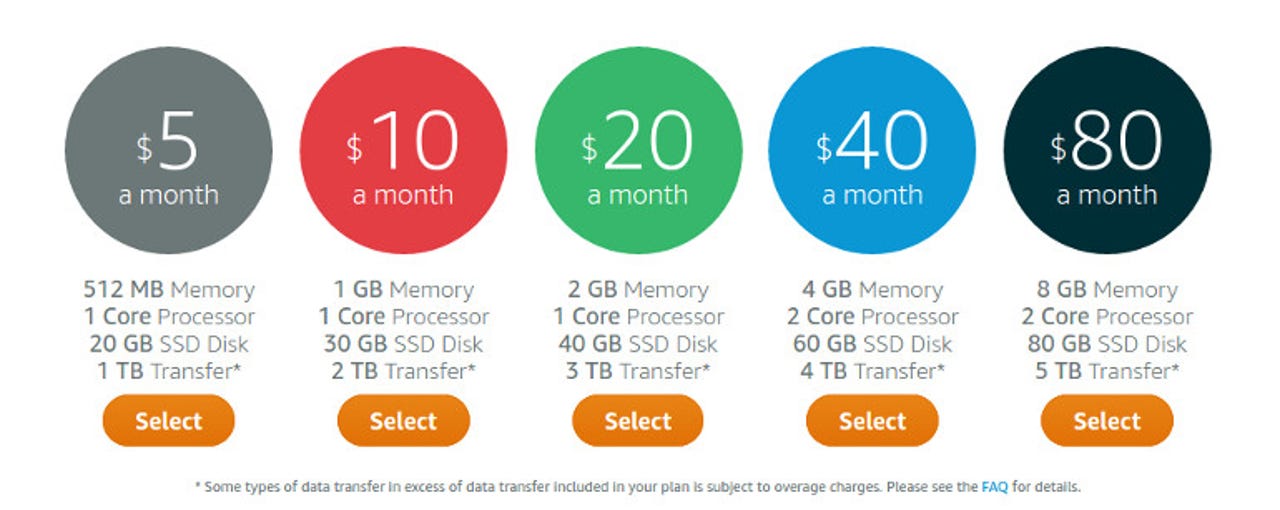Amazon Lightsail: The private server killer

Before the cloud, we often rented servers from hosting companies. We still do, but now Amazon is coming after those businesses with Amazon Lightsail.

Amazon Lightsail enables you to easily set up servers on the AWS cloud.
Hosting companies, and their virtualized descendants -- virtual private server companies such as Bluehost, Digital Ocean, and Linode -- provide remote servers for developers, websites, and businesses needing other internet services. They continue to be very popular with small and medium sized businesses (SMBs) that can't afford or don't need a data center or public cloud services.
AWS re:Invent
Amazon plans on beating these businesses by offering customers Amazon Web Service (AWS)-based virtual private servers (VPSs) for prices starting at $5 a month. That's a price that many hosting and VPS customers will find very attractive.
Unlike AWS, where pricing and customization can become very complicated, Lightsail looks to be easy for experienced VPS system administrators.
Amazon claims customers can get started with just three clicks. You can simply choose a virtual private server image from a menu of over 10 images. These include a basic Linux, Apache, MySQL, PHP/Perl/Python (LAMP) stack, WordPress, Drupal, and others. Bitnami, the leading provider of ready-to-run cloud and container application instances, created these images.
These aren't bare-boned instances. They include all the default software you need to really put a server application to work. For example, the Nginx web server development environment comes also bundled with phpMyAdmin, SQLite, ImageMagick, FastCGI, Memcache, GD, CURL, PEAR, PECL, and other components.
Users then select one of five server sizes. These range from the beginner $5 a month model. This includes 512MBs of RAM, a one-core processor, a 20 GB solid-state-drive (SSD), and one Terabyte (TB) per month of data transfer. That may not sound like much, but it's enough to run most low-usage LAMP server applications. At the $80 a month high-end, you get 8GBs of RAM, a two-core CPU, an 80 GB SSD, and 5 TBs of transfer. That's enough to power many small businesses.
All Lightsail's VPSs come with a static IP address, secure shell (SSH) connectivity, DNS management, and server monitoring. It also includes a web-based management console.
Once you've picked out your image, Lightsail automatically launches the VPS, attaches the SSD-based storage, and sets up the security groups. It then creates a Virtual Private Cloud (VPC), and makes it easy to set up your VPS's DNS and IP addresses.
Daniel Lopez, Bitnami's CEO, told me in an online discussion, "Lightsail is the logical step for Amazon to continue to expand their footprint among developers. It is easy to get started but if you need to scale you have the full power of AWS offering and eosystem that cannot be matched by VPS providers." He's not wrong.
On the other hand, Linode CMO Casey Smith said in an email: "We're flattered to see AWS create an offering similar to our own. There is great value in simplicity, which is why we've stuck with offering our services in this way since 2003. AWS's entry into this market just reinforces that value."
Smith continued, "The developer and small-business communities stand to benefit the most from this competition, and we welcome it. As for Linode, we will continue to differentiate ourselves as we always have -- in server performance and quality of support and with our position as a hosting provider built for developers, by developers."
Lightsail is already available. If you already have an AWS account, you can create a Lightsail VPS today.
Related Stories: